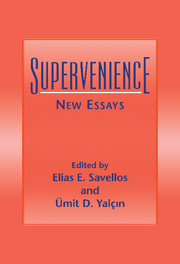Book contents
- Frontmatter
- Contents
- List of Contributors
- Introduction
- Varieties of Supervenience
- Supervenience: Model Theory of Metaphysics?
- “Global” Supervenient Determination: Too Permissive?
- Weak Supervenience Supervenes
- The Tweedledum and Tweedledee of Supervenience
- Reduction in the Mind of God
- Psychophysical Supervenience, Dependency, and Reduction
- Supervenience Redux
- Nonreducible Supervenient Causation
- Physicalism, Supervenience, and Dependence
- An Argument for Strong Supervenience
- Arguments for Supervenience and Physical Realization
- Supervenience and the Essences of Events
- How Does Ontology Supervene on What There Is?
- Supervenience and Intentionality
- Supervenience, Coherence, and Trustworthiness
- Does Truth Supervene on Evidence?
- Index
Introduction
Published online by Cambridge University Press: 29 March 2010
- Frontmatter
- Contents
- List of Contributors
- Introduction
- Varieties of Supervenience
- Supervenience: Model Theory of Metaphysics?
- “Global” Supervenient Determination: Too Permissive?
- Weak Supervenience Supervenes
- The Tweedledum and Tweedledee of Supervenience
- Reduction in the Mind of God
- Psychophysical Supervenience, Dependency, and Reduction
- Supervenience Redux
- Nonreducible Supervenient Causation
- Physicalism, Supervenience, and Dependence
- An Argument for Strong Supervenience
- Arguments for Supervenience and Physical Realization
- Supervenience and the Essences of Events
- How Does Ontology Supervene on What There Is?
- Supervenience and Intentionality
- Supervenience, Coherence, and Trustworthiness
- Does Truth Supervene on Evidence?
- Index
Summary
The Basic Concept
For most people who are not familiar with its many manifestations, analytical philosophy is the philosophy of reductionism par excellence. And the title is well earned when one recalls the string of reductionist programs that have left their mark on the first part of this century, ranging from the purported analytical reductions proposed by phenomenalism and behaviorism, to the weaker theoretical reductions of the later generations. Yet, starting with sporadic suggestions in the 1960s and 1970s, the philosophical literature is now rife with pronouncements of the wrongheadedness of all reductive programs. Perhaps surprisingly, the current literature associated with analytical philosophy is being swept by a wave of antireductionism.
Reductionism might be dead or dying, but the idea that certain entities we seem to talk and think about depend on others for their existence (and that they are somehow less real?) is still alive and kicking. This had led philosophers to search for a topic-neutral nonreductive dependence relationship that can be easily incorporated into the analytical toolbox of a variety of philosophical endeavors, performing at least part of the function reductive relationships were supposed to fulfill. Hence the recent philosophical interest in supervenience, which purports to be precisely this sort of relationship. Although the concept that the modern use of ‘supervenience’ aims to express has been around for some time, widespread interest in it is a relatively recent phenomenon.
- Type
- Chapter
- Information
- SupervenienceNew Essays, pp. 1 - 15Publisher: Cambridge University PressPrint publication year: 1995



